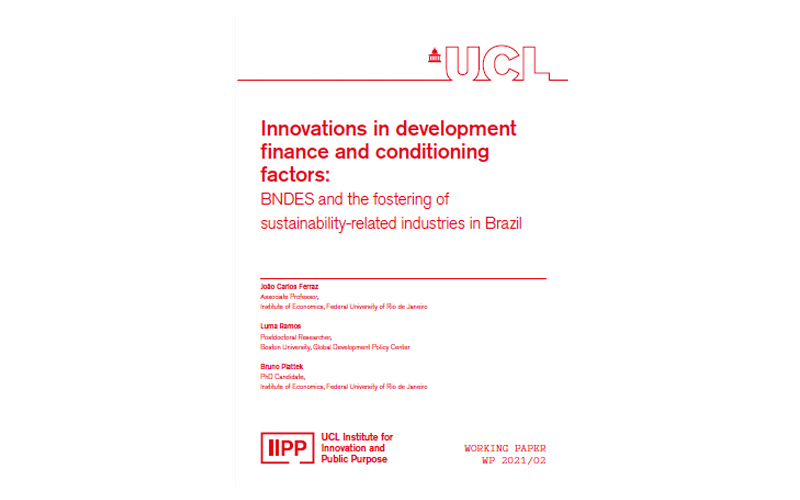Innovations in development finance and conditioning factors
This study by the UCL Institute for Innovation and Public Purpose analyses development finance innovations introduced by the Brazilian Development Bank, BNDES, to foster the local wind industry.

11 January 2021
UCL Institute for Innovation and Public Purpose (IIPP) Working Paper Series: IIPP WP 2021/02
Authors
- João Carlos Ferraz | Associate Professor, Institute of Economics, Federal University of Rio de Janeiro
- Luma Ramos | Postdoctoral Researcher, Boston University, Global Development Policy Center
Bruno Plattek | PhD Candidate, Institute of Economics, Federal University of Rio de Janeiro
Reference
Ferraz, J. C., Ramos, L. and Plattek, B. (2021). Innovations in development finance and conditioning factors: BNDES and the fostering of sustainability-related industries in Brazil. UCL Institute for Innovation and Public Purpose, Working Paper Series (IIPP WP 2021/02). Available at: https://www.ucl.ac.uk/bartlett/public-purpose/wp2021-02
Abstract
This article analyses development finance innovations introduced by the Brazilian Development Bank, BNDES, to foster the local wind industry and its suppliers in the 2010s; which factors conditioned its actions; and what the related outcomes were. This is an empirically oriented study based on an analytical framework inspired by the literature which debates the importance of public institution innovation and by the Schumpeterian tradition which highlights the relevance of innovation for economic development. It demonstrates that the alignment of exogenous and endogenous factors to financing agency factors explains the expansion of wind energy and local production capabilities in the related supply industry in Brazil. Technology, market and policy drivers constituted exogenous windows of opportunity, while from an endogenous perspective, BNDES mobilised internal competencies promptly to introduce and implement successive finance innovations to support the development of sustainable industries. It is hoped that this article may be a source of inspiration for those engaged in researching and promoting policy innovations.
 Close
Close

